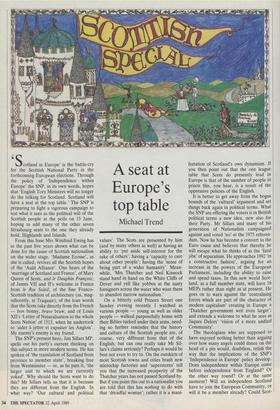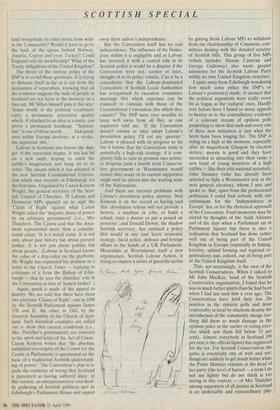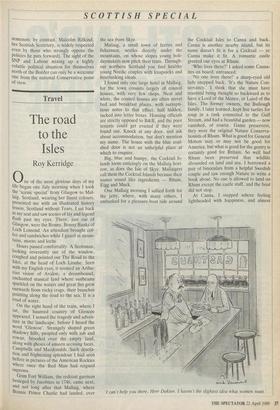A seat at Europe's top table
Michael Trend
Scotland in Europe' is the battle-cry for the Scottish National Party in the forthcoming European elections. Through the policy of 'Independence within Europe' the SNP, in its own words, hopes that 'English Tory Ministers will no longer do the talking for Scotland. Scotland will have a seat at the top table.' The SNP is preparing to fight a vigorous campaign to test what it sees as the political will of the Scottish people at the polls on 15 June, hoping to add many of the other seven Strasbourg seats to the one they already hold, Highlands and Islands. From this base Mrs Winifred Ewing has in the past five years shown what can be done for the cause of Scottish nationalism on the wider stage. 'Madame Ecosse', as she is called, revives all the Scottish hopes of the 'Auld Alliance'. One hears of the 'marriage of Scotland and France', of Mary Queen of Scots, and le Dauphin Francois; of James VII and II's welcome in France from le Roi Soleil; of the fine Franco- Scottish tradition of architecture (as, mag- nificently, at Traquair); of the loan words that the Scots take directly from the French — bon bonny, brave braw; and of Louis XII's 'Letter of Naturalisation to the whole Scots Nation' of 1513, when he undertook to 'alder a jetter et expulser les Anglois'. My enemy's enemy is my friend. The SNP's present hero, Jim Sillars MP, spells out his party's current thinking on this subject in more modern terms. He has spoken of 'the translation of Scotland from province to member state', breaking free from Westminster — or, as he puts it, 'the larger unit to which we are currently yoked'. Why should the Scots want to do this? Mr Sillars tells us that it is because they are different from the English. In what way? 'Our cultural and political values'. The Scots are presented by him (and by many others as well) as having an ability to 'put aside self-interest for the sake of others'; having a 'capacity to care about other people'; having the 'sense of being part of a wider humanity'. Mean- while, 'Mrs Thatcher and Neil Kinnock stand hand in hand on the White Cliffs of Dover and yell like yobbos at the nasty foreigners across the water who want them to abandon narrow nationalism.' On a bitterly cold Princes Street one Sunday evening recently I watched as various people — young as well as older people — walked purposefully home with their Bibles tucked under their arms, need- ing no further reminder that the history and culture of the Scottish people are, of course, very different from that of the English; but can one really take Mr Sil- lars's claims seriously? Perhaps it would be best not even to try to. On the outskirts of most Scottish towns and cities brash new microchip factories and 'superstores' tell you that the increased prosperity of the Thatcher years has not passed Scotland by. But if you point this out to a nationalist you are told that this has nothing to do with that 'dreadful woman'; rather it is a mani- festation of Scotland's own dynamism. If you then point out that the one league table that Scots do presently lead in Europe is that of the number of people in prison this, you hear, is a result of the oppressive policies of the English. It is better to get away from the bogus bounds of the 'cultural' argument and set things back again in political terms. What the SNP are offering the voters is in British political terms a new idea, new also for their Party. Mr Sillars and many of his generation of Nationalists campaigned against and voted `no' at the 1975 referen- dum. Now he has become a convert to the Euro cause and believes that thereby he will escape what he thinks of as the 'fatal jibe' of separatism. He approaches 1992 'in a constructive fashion', arguing for an increase in the powers of the European Parliament, including the ability to raise and spend taxes. In this new world Scot- land, as a full member state, will have 16 MEPs rather than eight as at present. He goes on to warn against the 'centralising forces which are part of the character of modern capitalism' creating in Europe a 'Thatcher government writ even larger'; and extends a welcome to what he sees as Jaques Delors"vision of a more unified Community'. The theologians who are supposed to have enjoyed nothing better than arguing over how many angels could dance on the head of a pin would, doubtless, relish the way that the implications of the SNP's 'Independence in Europe' policy develop. Does independence within Europe come before independence from England? Or the other way round? Or at the same moment? Will an independent Scotland have to join the European Community, or will it be a member already? Could Scot-
SCOTTISH SPECIAL
land renegotiate its entry terms from with- in the Community? Would it have to go to the back of the queue behind Norway, Austria, Cyprus and even Turkey? Could England veto its membership? What of the Treaty obligations of the United Kingdom?
The thrust of the current policy of the SNP is to avoid these questions. It is trying to distance itself as far as it can from the accusation of separatism, knowing that all the evidence suggests the bulk of people in Scotland are not keen at the moment on a bust-up. Mr Sillars himself puts it this way: 'Some words in the political vocabulary carry a permanent pejorative quality which, if attached to an idea or a party, can prove a permanent handicap. "Separat- ism" is one of those words . . . Independ- ence within Europe destroys, at a stroke, the separatist jibe.'
Labour in Scotland also knows the dan- ger of the separatist stigma. It too has hit on a new angle, hoping to catch the public's imagination and hang on to its votes. The means which it has adopted is the new Scottish Constitutional Conven- tion which met recently in Edinburgh for the first time. Organised by Canon Kenyon Wright, the general secretary of the Scot- tish Council of Churches, 50 Labour and Democrat MPs queued up to sign the 'Claim of Right' against what Canon Wright called the 'despotic abuse of power by an arbitrary government' (i.e., Mrs Thatcher). The Canon said that the docu- ment represented more than a constitu- tional claim. 'It is a moral claim. It is not only about past history but about present justice. It is not just about politics but about people.' (Labour in Scotland knows the value of a dog-collar on the platform; Mr Wright has explained his position in a letter to the Church Times — replying to criticisms of it from the Bishop of Edin- burgh — that he sees the churches' role in the Convention as that of 'honest broker'.) Again, much is made of the appeal to history. We are told that there have been two previous 'Claims of Right': one in 1698 by the Scottish Parliament against James VII and II, the other in 1842 by the General Assembly of the Church of Scot- land. Such historical examples are rolled out to show that current conditions (i.e., Mrs Thatcher's government) are contrary to the spirit and letter of the Act of Union. Canon Kenyon writes that 'the absolute unlimited sovereignty of the Crown (or the Crown in Parliament) is questioned on the basis of a traditional Scottish understand- ing of power'. The Convention's plan is to undo the centuries of wrong that Scotland is presented as having suffered since: in this version, an unrepresentative and shod- dy gathering of Scottish politicos met in Edinburgh's Parliament House and signed
away their nation's independence.
But the Convention itself has no real independence. The influence of the Demo- crats within it is negligible and as Labour has invested it with a central role in its Scottish policy it would be a disaster if the Convention were not, sooner or later, thought of as its policy vehicle. Can it be a coincidence that the Labour-dominated Convention of Scottish Local Authorities has reorganised its executive committee meetings (for which expenses can be claimed) to coincide with those of the Constitutional Convention (for which they cannot)? The SNP were very sensible to keep well away from all this; as one supporter told me, 'If the Convention doesn't sooner or later adopt Labour's devolution policy I'll eat my sporran.' Labour is pleased with its progress so far but it knows that the Convention route is potentially a high-risk strategy; if it com- pletely fails to turn its promise into politic- al progress (and a fourth term Conserva- tive government at Westminster would ensure this) many of its current supporters might well be driven into the waiting arms of the Nationalists.
And there are internal problems with Labour's devolution policy anyway. Neil Kinnock is on the record as having said that 'devolution reform will not provide a factory, a machine or jobs, or build a school, train a doctor or put a pound on pensions'; and Donald Dewar, the shadow Scottish secretary, has outlined a policy that would in any case leave economic strategy, fiscal policy, defence and foreign affairs in the hands of a UK Parliament. Meanwhile at Westminster itself a new organisation, Scottish Labour Action, is trying to employ a series of guerrilla tactics by getting Scots Labour MPs to withdraw from the chairmanship of Commons com- mittees dealing with the detailed scrutiny of Scottish bills. This group of five MPs (which includes Dennis Canavan and George Galloway) also wants greater autonomy for the Scottish Labour Party within its own United Kingdom structure.
I came away from Edinburgh wondering how much sense either the SNP's or Labour's position(s) made; it seemed that the political arguments were really every bit as bogus as the 'cultural' ones. Hardly ever before have I heard so many appeals to history or to the contradictory evidence of a constant stream of opinion polls purporting to show that each and every one of these new initiatives is just what the Scots have been longing for. The SNP is riding on a high at the moment, especially after its magnificent Glasgow by-election victory; morale is good and they have succeeded in attracting into their ranks a new band of young members of a high calibre — like their able national secretary, John Swinney (who has already been selected to fight a Westminster seat at the next general election), whom I met and spoke to. But, apart from the professional politicians I could find nobody with any enthusiasm for the 'Independence in Europe' line or for the rhetorical approach of the Convention. Fond memories may be stirred by thoughts of the Auld Alliance and of the days when a Parliament sat in Parliament Square but there is also a realisation that Scotland has done rather well out of being part of the United Kingdom in Europe (especially in fishing, forestry, upland farming and regional re- generation) and indeed, out of being part of the United Kingdom itself.
That, not surprisingly, is the view of the Scottish Conservatives. When I talked to Mr John MacKay, head of the Scottish Conservative organisation, I found that he was in much better spirits than he had been when I had last seen him a year ago. The Conservatives have held their low 20s position in the opinion polls and done respectably in local by-elections despite the introduction of the community charge (no- thing did them so much damage in the opinion poles as the earlier re-rating exer- cise which saw them fall below 15 per cent). Almost everybody in Scotland (99 per cent is the official figure) has registered for the tax. For Scottish Conservatives the game is essentially one of wait and see; things are unlikely to get much better while the Prime Minister remains at the head of her party (the level of hatred — a term I do not use lightly but do not think is too strong in this context — of Mrs Thatcher among supporters of all parties in Scotland is an undeniable and extraordinary phe-
SCOTTISH SPECIAL
nomenon; by contrast, Malcolm Rifkind, her Scottish Secretary, is widely respected even by those who strongly oppose the Policies he puts forward). The sight of the SNP and Labour mixing up a highly volatile political situation for themselves north of the Border can only be a welcome one from the national Conservative point of view.




































































 Previous page
Previous page